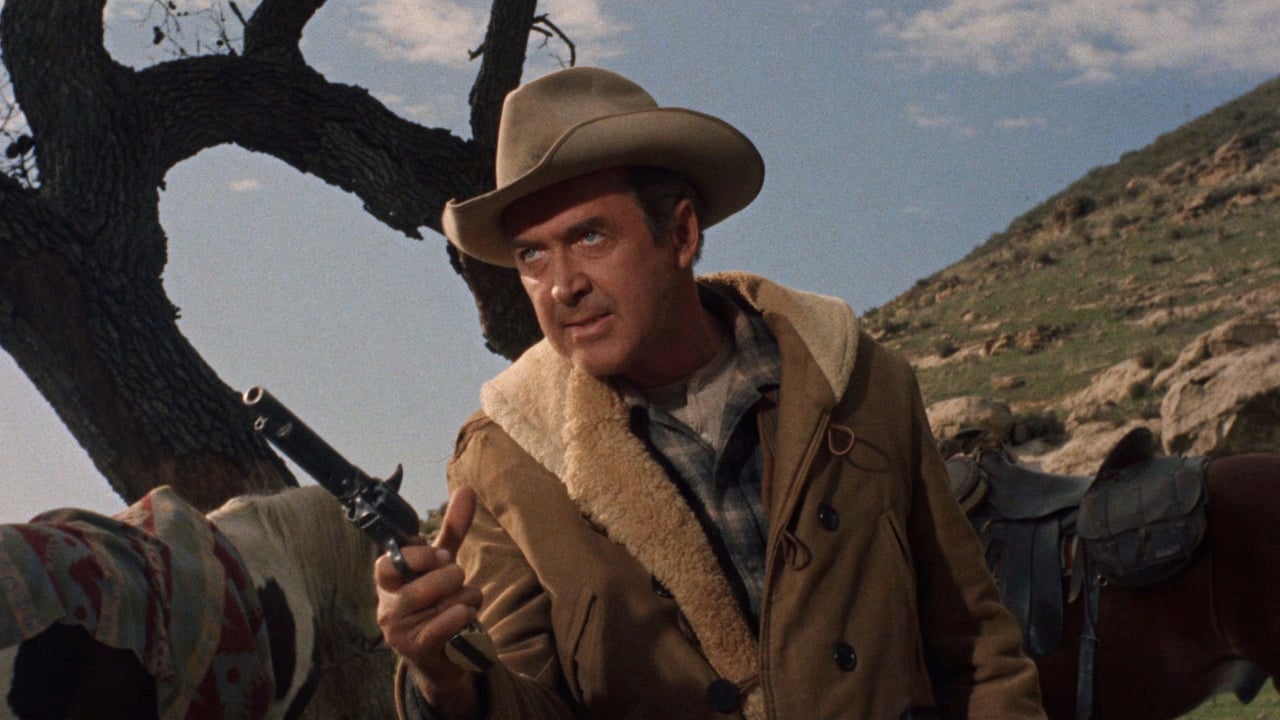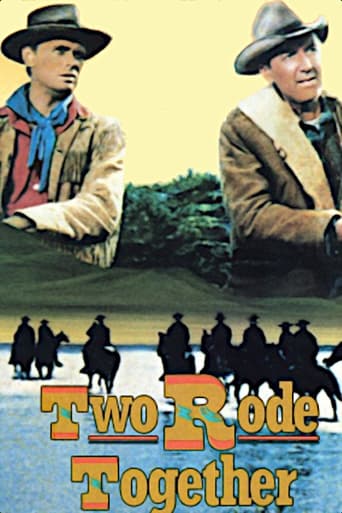Konterr
Brilliant and touching
ChicDragon
It's a mild crowd pleaser for people who are exhausted by blockbusters.
Robert Joyner
The plot isn't so bad, but the pace of storytelling is too slow which makes people bored. Certain moments are so obvious and unnecessary for the main plot. I would've fast-forwarded those moments if it was an online streaming. The ending looks like implying a sequel, not sure if this movie will get one
Rio Hayward
All of these films share one commonality, that being a kind of emotional center that humanizes a cast of monsters.
ianlouisiana
Marshall McCabe(Mr J.Stewart) combines his duties as a law man with the rather less onerous task of being a pimp/entrepreneur and go - to guy.When he says "This is my town" he really means it. He is persuaded by an old friend,now a rather elderly Cavalry lieutenant (Mr R.Widmark) to assist negotiations with the Comanche for the release of prisoners captured some years earlier. He has had dealings with Chief Quannah Parker before and apparently speaks the language although all we hear is him talking in pidgin English to the chief whose vocabulary and grammar seems better than his own. A boy and a girl are returned to the settlers.The boy has totally absorbed the Comanche culture and is treated as little more than a wild animal. He stabs to death a woman who wants to believe he is her son and,despite a plot "twist" that any cinema - goer over the age of eight could have foreseen,is promptly lynched. The girl,a Mexican aristocrat,has retained her identity despite being married to warrior for five years. When her husband comes to rescue her,McCabe promptly shoots him dead,broaching an argument regarding what constitutes "rescue" and what constitutes "kidnap". McCabe has no such sensitivities. "Two rode together"is sometimes seen by critics as an apologia for the racism and misogyny they see in Mr Ford's earlier masterpiece on the same theme. Others that he rushed through it in order to start "The man who shot Liberty Vallance" where Mr Stewart seems much more at home. Personally,I think Mr Ford merely had a bad day a the office.
James Hitchcock
In "Two Rode Together" John Ford returns to the theme he had earlier dealt with in "The Searchers", that of white people raised or held captive by the Indians. (In "The Unforgiven" from the previous year, Ford's rival John Huston had dealt with the opposite theme, that of an Indian girl- strangely played by a miscast Audrey Hepburn- raised as white by her adoptive family). The "two" of the film's title are Marshal Guthrie McCabe and his friend Lieutenant Jim Gary who are tasked by Gary's superior, Major Fraser, with the job of ransoming any white captives being held by the Comanche. Because Fraser is coming under pressure from relatives of the captives the two are authorised to use any means to achieve this end, including offering modern rifles to the Comanche in exchange, even though it is normally taken for granted in Westerns that the greatest reason any white man can commit is to sell weapons to the Indians.Ford's normal favourite actor John Wayne does not appear in this film; the leading roles are taken by James Stewart and Richard Widmark. In the early part of his career, Stewart was not an actor particularly associated with Westerns ("Destry Rides Again" being an exception) but in the fifties he got a taste for the genre and made a number of fine ones with director Anthony Mann. He fell out with Mann after the latter withdrew from "Night Passage", but this did not affect his love for the Western and he found a new collaborator in Ford. They did not, it would appear, get on particularly well on the set of "Two Rode Together", but nevertheless went on to make three move films together, including "The Man Who Shot Liberty Valance" and "Cheyenne Autumn".One weakness that occasionally crept into Ford's movies was a tendency to introduce some inappropriate humour into an otherwise serious film. That was even true of films as good as "The Searchers" and "Cheyenne Autumn", and it is certainly true here. The film is based around some serious themes such as ethnic identity, racism and the relationship between Native Americans and white settlers. It purports to examine the bigotry shown by many whites towards both the Indians themselves and any whites felt to be "tainted" by association with them. (Those captives whom McCabe and Gary eventually rescue are not made welcome by their own people). It includes some violent incidents such as a woman being stabbed to death and a teenage boy being lynched by a mob. Yet the tone is at times curiously light-hearted, especially in its depiction of the relationship between McCabe and Gary.The main culprit is Stewart, who had done some great work with Mann but here seems far too laid-back. McCabe is far from being a spotless hero; when we first meet him he is acting as the business partner of a "saloon owner", which here is a polite euphemism for "brothel keeper", and living off a percentage of her immoral earnings. His motives for accepting Fraser's commission are mostly mercenary ones. Now in his collaborations with Mann Stewart (who in the earlier part of his career had generally played clean-cut "Mr Nice Guy" characters) created some memorably flawed heroes, such as Howard Kemp in "The Naked Spur", but seems unable to do the same here. Ford was not particularly satisfied with "Two Rode Together"; he believed that he had treated the same theme far better in "The Searchers". (He was dead right there). This is not perhaps the worst Ford film; that must be that horribly overrated sentimental piece of Irish blarney, "The Quiet Man". It is, however, the worst Ford Western I have seen, and probably the worst Stewart Western as well. 5/10
Turtle Heart
As a child I loved these old John Ford Films. Many years later, because of all the new releases to DVD and Blue Ray, we get to revisit some of these great classics. Watching this film, now, I found I could not finish it. Quannah Parker, a Commanche American Indian is so revered by his people. He was a really important figure, considered one of the great American Indian leaders of his time. In this film he is reduced to being a scalp-hunting, white child-rapist terrorist. I realize now that this vehement and terrible hatred of the American Indian is the central theme of John Ford's many films which touch this subject. I am an American Indian. Looking at this film is really painful because it fantasizes about a history that never happened. Of course, a good fiction adventure needs its enemy to work in Hollywood. That is the problem. Where can we go to find an enemy worthy of the adventures of our hero? I believe this fim should come with a warning label about its depiction of violent racism against the American Indian. This was really such a dark time for this minority in film. Maybe many in the Middle East have this same feeling when watching how Arabian people are depicted in film in this age. Seeing Quannah Parker portrayed in this way, by this horrible actor, is really tragic and emotionally painful to any reasonable American Indian. Clearly, at some point the life and character of John Ford needs to be examined more closely. There is a disturbingly violent hatred of the American Indian in these films.
Michael_Elliott
Two Rode Together (1961) *** (out of 4) Surprisingly pleasant Western about a Marshall (James Stewart) and military officer (Richard Widmark) who are sent by the government to Comanche territory where they want the Marshall to try and get back several white people who were kidnapped years earlier. While Widmark has good plans in his heart, Stewart on the other hand is simply in it for the cash. Many reviews have called this Ford film a "been there, done there" type of thing, which I'd somewhat agree with since this does contain elements of THE SEARCHERS. That's about all I'd agree with because I found the story to be quite poignant and the performances excellent. Those wanting 100% action are probably going to be disappointed because there's very little of that and instead we're treated to a very good story that will make you think. THE SEARCHERS dealt with some of the issues that might happen when young female kids are kidnapped by Indians but this film takes it up a few notches as Stewart, in a rather mean fashion, informs people that their 9-year-old daughters who went missing years ago are now used up women who probably have many half-breeds. The racial tensions are very high in the film as many of the white folks can't come to terms with this and this is just part of the film that tries to make you think. When one of the kidnapped victims are brought back, the white people's prejudices are much greater than the race they look down upon and Ford is very clever in how he gets his message across without being preachy. Stewart and Widmark are terrific together and their energy certainly helps keep things moving. The Stewart character is an interesting one because the first portion of the film we see that lovable Stewart as he tells funny stories, makes light of everything and is just an all around likable guy. The second half is when that darker character comes out and this is where Stewart really shines. The way he uses that brutal honesty to really put hopeful people in their place was very effective and the actor does a marvelous job with it. Widmark gets the lesser of the two characters but that stern and straight-forward nature of his comes through very effectively. Shirley Jones is quite good in the role of a woman searching for her brother and we get the one and only Andy Devine for some great comic relief. The banter between he and Stewart early on is priceless. The cast also includes Linda Cristal, John McIntire, Harry Carey, Jr. and Mae Marsh in a brief part. TWO RODE TOGETHER has a few dry moments that bog the film down but on the whole it's a pretty impressive feature that has been overlooked probably because it's not as grand as some of the director's other works.

